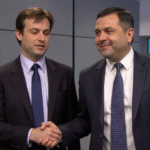The Misconception of Money and Happiness
It’s common to think, “Once I earn more, I’ll be happier,” or “That new car would make me very happy,” or “If I had that trendy phone, my life would be better.” But what is money’s real role in building happiness? Can it, by itself, bestow it?
The Research on Money and Happiness
A study by Nobel laureate in Economics, Daniel Kahneman (2002), concluded that emotional well-being increases with income up to a certain point; beyond this threshold, daily happiness does not significantly improve with more money.
“Money can continue to buy happiness for those who are already happy,” the analysis notes, “but among the most unhappy, it only helps to avoid unhappiness to a certain extent.”
The Perspective of Financial Life Coach, María José Codesal Arriaga
María José Codesal Arriaga, a personal finance coach, agrees that higher income does change one’s life sense, as people tend to use money differently—through foundations or social spending—which generates greater satisfaction.
She adds that money also helps reduce suffering, providing tranquility and peace. “You can open doors to happiness-related aspects, such as affording healthcare, living in safer spaces, or quieter social environments, all translating to overall well-being.”
According to the National Financial Health Survey (ENSAFI), at least 35% of Mexicans aged 18 and over have experienced physical discomfort due to financial stress. Codesal states this confirms that a healthy relationship with money is crucial for emotional well-being and deep happiness.
Distinguishing Between Temporary Happiness and Lasting Fulfillment
Codesal explains that being happy refers to a fleeting feeling linked to money because it can buy experiences or specific moments. In contrast, being happy has a deeper and more enduring meaning, based on clarity about personal values and goals, with money as an ally.
“Deep happiness can be experienced independently of the bank account balance, as long as it provides security and peace without causing imbalances through excessive consumption. It’s not about having more money but maintaining a healthy relationship with it,” she clarifies.
The expert proposes designing an intentional life where money is a tool to achieve significant goals rather than an end in itself, with balanced income, expenses, and savings for the future.
Money: A Long-Term Well-being Asset
Valentina Luján, a happiness sciences specialist, states that while money is necessary, it’s insufficient for achieving happiness. “Although it’s needed to meet basic needs, its impact on well-being is temporary when used only for accumulating or purchasing material goods.”
The key, she explains, lies in how it’s used: prioritize saving for financial freedom and investing in experiences rather than objects, as the latter generate significant memories and lasting well-being.
“An income increase can temporarily boost well-being, but this effect doesn’t last. Thinking someone can live purposefully without meeting basic needs is unrealistic; however, having money doesn’t guarantee happiness,” she adds.
Author of “Being Happy is for the Brave,” Luján highlights two key financial habits: saving, which brings freedom and stability, and investing in experiences, which provide more long-term happiness than object purchases.
Lastly, she warns that prioritizing physical, intellectual, emotional, and spiritual well-being over money paradoxically leads to greater professional and financial success. “Happy people are more productive, creative, and have better relationships. Focusing solely on power, fame, or money, however, incurs high costs in terms of well-being, leading to burnout and a lack of purpose.”
Key Questions and Answers
- Q: Can money directly buy happiness? A: Money can contribute to happiness by providing means to secure basic needs and reduce suffering, but it doesn’t directly bestow happiness.
- Q: How does income affect happiness? A: Income contributes to happiness up to a certain point; beyond that, additional income doesn’t significantly increase daily happiness.
- Q: What’s the healthier approach to managing money for well-being? A: Prioritize saving for financial freedom, invest in experiences rather than material goods, and maintain a balanced relationship with money.
- Q: Is there a correlation between happiness and financial stability? A: Financial stability contributes to well-being by reducing stress related to meeting basic needs, but true happiness is about living in alignment with personal values and goals.






